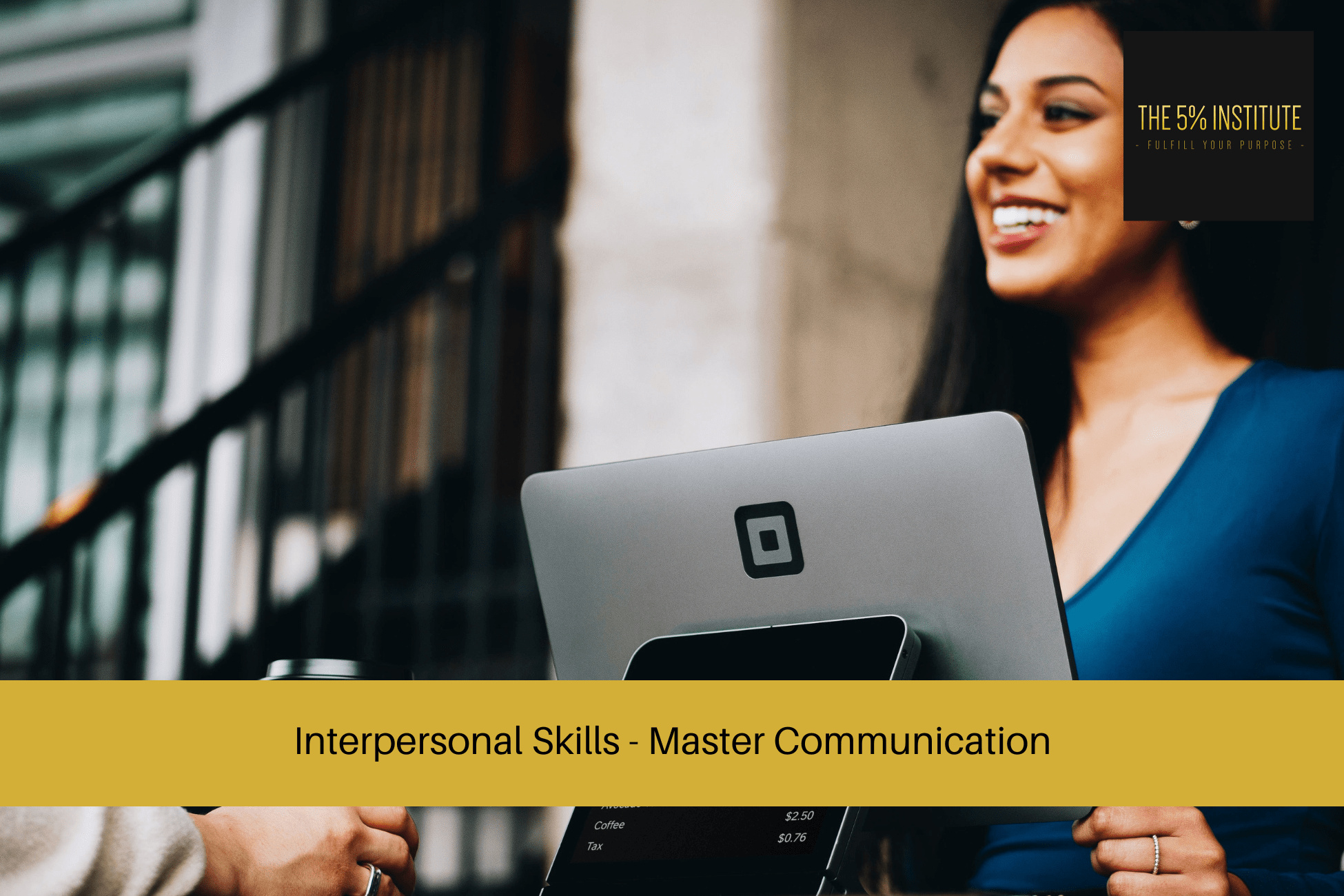
Interpersonal Skills – Master Communication
Interpersonal skills, also known as people skills or social skills, play a fundamental role in our personal and professional lives.
These skills enable us to effectively communicate, collaborate, and build strong relationships with others.
In today’s interconnected world, possessing strong interpersonal skills has become increasingly important for success in various domains, including business, education, and personal relationships.
In this article, we will explore the significance of interpersonal skills and provide practical tips for enhancing these skills to thrive in any social setting.
1. Introduction to Interpersonal Skills
Interpersonal skills encompass a wide range of abilities that facilitate effective interaction with others.
These skills include communication, empathy, conflict resolution, collaboration, leadership, and more.
Whether you are engaging in a conversation with a colleague, leading a team, or resolving conflicts in a relationship, interpersonal skills are crucial for achieving positive outcomes.
2. Understanding the Importance of Interpersonal Skills
Effective interpersonal skills can greatly impact various aspects of our lives.
They contribute to building meaningful relationships, fostering teamwork, resolving conflicts, and creating a positive work environment.
Furthermore, these skills can enhance our personal well-being by improving self-awareness, empathy, and emotional intelligence.
3. Developing Effective Communication Skills
Interpersonal Verbal Communication Skills:
Clear and Concise Expression
One of the key aspects of effective verbal communication is expressing oneself clearly and concisely.
Articulating thoughts in a coherent manner enables others to understand your ideas and perspectives.
Use straightforward language, avoid jargon, and organize your thoughts to deliver a concise message.
Active Listening
Active listening is a fundamental skill that involves fully focusing on and comprehending the speaker’s message.
It requires giving undivided attention, maintaining eye contact, and providing verbal or nonverbal cues to show your engagement.
By actively listening, you can foster better understanding and build stronger connections with others.
Interpersonal Non Verbal Communication Skills:
Body Language
Nonverbal communication, including body language, plays a significant role in conveying messages and establishing rapport.
Pay attention to your posture, gestures, and facial expressions to ensure they align with the intended message.
Open body language, such as maintaining an upright posture and using appropriate hand movements, can help create a positive and welcoming atmosphere.
Eye Contact
Maintaining appropriate eye contact is crucial in communication. It demonstrates interest, respect, and attentiveness.
However, it’s important to strike a balance and not make prolonged or intense eye contact, which can make others uncomfortable.
Adjust your eye contact based on cultural norms and the context of the interaction.
4. Building Empathy and Emotional Intelligence
Empathy
Empathy is the ability to understand and share the feelings of others.
It involves stepping into someone else’s shoes, seeing things from their perspective, and acknowledging their emotions.
Cultivating empathy allows for deeper connections and more effective communication.
Practice active listening and show genuine concern for others’ experiences and emotions.
Perspective-Taking
Perspective-taking is closely related to empathy.
It involves imagining oneself in another person’s situation to gain a better understanding of their thoughts, feelings, and motivations.
By adopting different perspectives, you can enhance empathy and develop a broader worldview.
Understanding Emotions
Emotional intelligence involves recognizing and managing emotions, both in oneself and others.
Being aware of your own emotions and understanding how they influence your behaviour can help you respond more effectively in various situations.
Similarly, being attuned to others’ emotions enables you to respond with empathy and support.
5. Developing Conflict Resolution Skills
Recognizing and Addressing Conflicts
Conflict is a natural part of human interaction, and developing the skills to address conflicts constructively is essential.
Recognize the signs of conflict, such as tension, disagreement, or misunderstandings, and address them proactively.
Avoiding or suppressing conflicts can lead to further complications, so it’s crucial to confront and address them in a respectful manner.
Active Listening in Conflict Situations
When conflicts arise, active listening becomes even more crucial.
Give each party involved an opportunity to express their thoughts and feelings without interruption.
Show empathy and validate their perspectives, even if you disagree.
This can create a safe space for open dialogue and promote understanding.
Finding Win-Win Solutions
In conflict resolution, the goal is to find win-win solutions that satisfy the needs and interests of all parties involved.
Encourage open communication and brainstorming to generate creative solutions.
Look for common ground and areas of compromise that can lead to mutually beneficial outcomes.
6. Collaborative and Teamwork Skills
Effective Collaboration
Collaboration is vital in today’s interconnected world, where teamwork is often required to accomplish complex tasks.
Develop skills such as active participation, cooperation, and effective communication within a team.
Be willing to contribute ideas, listen to others, and work towards a shared goal.
Building Trust and Cooperation
Trust and cooperation are the foundations of successful collaboration.
Build trust by being reliable, accountable, and supportive of your team members.
Foster a cooperative environment by encouraging open communication, respecting diverse opinions, and valuing everyone’s contributions.
7. Leadership Skills and Influence
Inspiring and Motivating Others
Effective leaders inspire and motivate their team members to achieve their best.
They provide clear goals, offer support, and recognize the achievements of their team members.
By setting a positive example and fostering a motivating environment, leaders can encourage individuals to go above and beyond.
Decision Making and Problem Solving
Leadership involves making sound decisions and solving problems efficiently.
Develop skills in gathering relevant information, analysing different perspectives, and considering the potential outcomes of decisions.
Effective leaders involve their team members in the decision-making process whenever possible to encourage collaboration and diverse insights.
8. Adapting to Different Personalities and Cultural Differences
Recognizing Individual Differences
People have diverse personalities, backgrounds, and communication styles.
Being aware of these individual differences allows for more effective interactions and prevents misunderstandings.
Adapt your communication approach based on the needs and preferences of others, demonstrating flexibility and understanding.
Cultural Sensitivity
In an increasingly globalized world, cultural sensitivity is crucial for successful interpersonal interactions.
Educate yourself about different cultures, customs, and norms to avoid cultural misunderstandings and promote inclusivity.
Be respectful, open-minded, and willing to learn from diverse perspectives.
9. Time Management and Organization Skills
Prioritization and Planning
Effective time management involves prioritizing tasks and planning ahead.
Set clear goals and break them down into smaller, manageable steps.
Prioritize tasks based on urgency and importance, and allocate your time accordingly.
This allows for better productivity and reduces stress.
Meeting Deadlines
Meeting deadlines is essential for maintaining credibility and professionalism.
Develop strategies to manage your time effectively, such as creating schedules, setting reminders, and breaking tasks into manageable chunks.
Avoid procrastination and establish a disciplined approach to ensure timely completion of projects.
10. Developing Networking Skills
Building Professional Relationships
Networking is a valuable skill for establishing and nurturing professional relationships.
Attend industry events, engage in online communities, and connect with individuals in your field.
Be genuine, show interest in others, and offer support and expertise when appropriate.
Networking can open doors to opportunities and collaborations.
Effective Networking Strategies
When networking, it’s essential to be strategic and intentional.
Identify your goals and target specific individuals or groups who can help you achieve those goals.
Be prepared with a clear introduction, articulate your skills and interests, and actively listen to others to identify potential synergies.
Follow up with contacts and maintain ongoing relationships is crucial for developing your interpersonal skills.
11. Continuous Learning and Self-Improvement
Seeking Feedback
Continuous learning and self-improvement involve seeking feedback from others.
Be open to constructive criticism and use it as an opportunity to grow.
Actively ask for feedback from mentors, peers, or supervisors to gain insights into areas for improvement and capitalize on your strengths.
Reflecting on Interactions
Reflection is a powerful tool for personal growth and your interpersonal skills development.
Take time to reflect on your interactions, identify what went well, and consider areas for improvement.
Reflecting allows for self-awareness and the opportunity to refine your interpersonal skills over time.
12. Concluding Interpersonal Skills Development
Mastering interpersonal skills is a lifelong journey that can significantly impact both personal and professional success.
By developing effective communication, empathy, conflict resolution, collaboration, and leadership skills, you can build meaningful relationships, navigate challenges, and thrive in diverse social settings.
Remember that practicing and refining these skills takes time and effort, but the rewards are well worth it.
Interpersonal Skills FAQ’s
1. How long does it take to improve interpersonal skills?
Improving interpersonal skills is a gradual process that varies from person to person.
It depends on factors such as individual motivation, dedication, and the specific skills being developed.
With consistent practice and a growth mindset, noticeable improvements can be seen within a few months.
2. Are interpersonal skills essential for career success?
Yes, interpersonal skills are highly essential for career success.
In today’s professional landscape, employers value individuals who can effectively communicate, collaborate, and build strong relationships with colleagues, clients, and stakeholders.
These skills contribute to creating a positive work environment, fostering teamwork, resolving conflicts, and achieving shared goals.
3. Can interpersonal skills be learned or are they innate?
While some individuals may have a natural inclination towards certain interpersonal skills, such as empathy or communication, interpersonal skills can be learned and developed by anyone.
With practice, self-awareness, and a willingness to learn and adapt, individuals can significantly enhance their interpersonal skills over time.
4. How can I improve my active listening skills?
Improving active listening skills requires conscious effort and practice.
Start by giving your full attention to the speaker, maintaining eye contact, and refraining from interrupting.
Focus on understanding the speaker’s message rather than formulating your response. Practice empathy by putting yourself in their shoes and seeking clarification when necessary.
5. What role do interpersonal skills play in leadership?
Interpersonal skills are vital for effective leadership.
Leaders who possess strong interpersonal skills can inspire and motivate their team members, communicate their vision clearly, and build trust and cooperation.
These skills enable leaders to resolve conflicts, foster collaboration, and create a positive work culture that encourages the growth and success of their team.
Want To Close Sales Easier?
Are you committed to closing sales a lot easier, and consistently?
If so, you should check out our self-paced and affordable online sales training program; The 5% Sales Blueprint.
It’ll give you everything you need to close sales consistently.
To learn more, simply click on the link below for more information.
Our Online Sales Training Program – The 5% Sales Blueprint.



